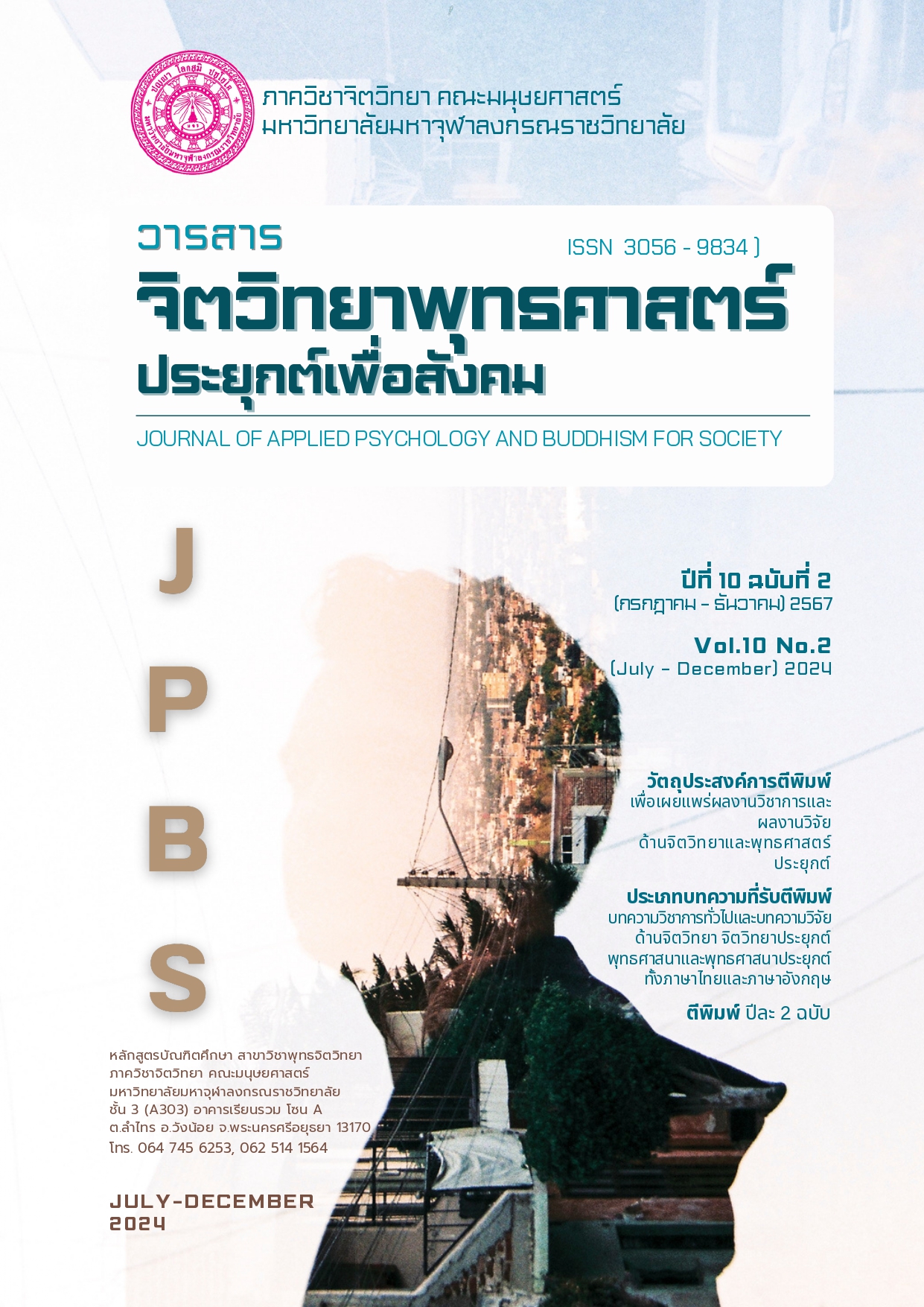Health Enhancing Program for Elderly Living Alone Based on Buddhist Psychology
Keywords:
Health Promotion, Elderly, Living Alone, Buddhist PsychologyAbstract
The objectives of this research are: 1. to study the current situation, problems, and health-related causes of elderly individuals living alone, 2. to develop a health promotion program for elderly individuals living alone based on Buddhist psychology, and 3. To evaluate the effectiveness of the health promotion program for elderly individuals living alone based on Buddhist psychology. The research employed a mixed-methods approach, utilizing participatory workshops and an experimental design in the form of a One Group Pre-test Post-test Design. The sample consisted of 51 elderly individuals from the Thung Maha Charoen community, with 15 participants selected based on specific criteria to join the health promotion program. The health promotion program consisted of six activities: 1) Awareness, 2) Commitment to good practice, 3) Adapting attitudes as routine, 4) Acting with wisdom, 5) Being a good friend, and 6) Developing the mind to let go. The program included practical sessions lasting 120 minutes each, over a 2-day, 1-night period.
The research findings showed that the average mental health score of elderly individuals living alone before participating in the program was 42.33 points, and after participating in the program, it increased to 46.00 points. This difference was statistically significant at the 0.01 level. Additionally, the elderly participants were able to apply the knowledge gained from the program to their daily lives, such as adjusting their attitudes and adopting a more positive outlook, which resulted in improved mental health and better social relationships.
References
กุลยา ตันติผลาชีวะ. (2560). คู่มือผู้สูงอายุสุขภาพสูงวัย ดูแลได้ด้วยตัวเอง. กรุงเทพฯ: เพชรประกาย.
ฐิติชญา ฉลาดล้น, สุทธีพร มูลศาสตร์, และวรรณรัตน์ ลาวัง. (2559). การพัฒนารูปแบบกิจกรรมสร้างเสริมสุขภาพผู้สูงอายุในชมรมผู้สูงอายุคลังปัญญา อำเภอบ้านโป่ง จังหวัดราชบุรี. วารสารพยาบาลกระทรวงสาธารณสุข, 27(2), 154-167.
ฐิติยา เนตรวงษ์ และ รัชฎาพร ธิราวรรณ. (2561). การใช้โปรแกรมส่งเสริมสุขภาพผู้สูงอายุตามหลักวิถีพุทธที่ส่งผลต่อสุขภาพที่ดีของผู้สูงอายุ (รายงานการวิจัย). กรุงเทพฯ: มหาวิทยาลัยสวนดุสิต.
พระครูสิริพุทธิศาสตร์ (นพรักษ์ นาเมือง), ธานี สุวรรณประทีป และ วิโรจน์ คุ้มครอง. (2566). การเสริมสร้างสุขภาพจิตของผู้สูงอายุตามหลักวิปัสสนาภาวนา : กรณีศึกษาชุมชนวัดสุคนธาราม อำเภอบางซ้าย จังหวัดพระนครศรีอยุธยา. วารสารนวัตกรรมการจัดการศึกษาและการวิจัย, 5(5), 1196-1206.
พระพรหมคุณาภรณ์ (ป.อ. ปยุตฺโต). (2566). พัฒนาคุณภาพชีวิตด้วยจิตวิทยาแบบยั่งยืน. สืบค้น 25 ตุลาคม 2567, จาก https://www.watnyanaves.net/th/book-full-text/295
พระมหาเชาวฤทธิ์ นรินโท (ทรัพย์สวัสดิ์). (2561). การศึกษาแนวทางการพัฒนาคุณภาพชีวิตผู้สูงอายุตามหลักภาวนา 4: กรณีศึกษาผู้สูงอายุบ้านห้วยหอย ตำบลธาตุทอง อำเภอภูเขียว จังหวัดชัยภูมิ (วิทยานิพนธ์ปริญญามหาบัณฑิต). มหาวิทยาลัยมหาจุฬาลงกรณราชวิทยาลัย. พระนครศรีอยุธยา.
พระมหาอำนวย มหาวีโร, ประพิศ โบราณมูล, อุทัย ภูคดหิน และ สุวนันท์ เฉลยพจน์. (2566). การใช้หลักบุญกิริยาวัตถุ 3 สำหรับพัฒนาคุณภาพชีวิตของผู้สูงอายุในภาคตะวันออกเฉียงเหนือ. วารสารวิชาการรัตนบุศย์, 5(2), 69-79.
วิมล บ้านพวน, จุฑาภัค เจนจิตร และ ร้อยเอกหญิง วัลภินันท์ สืบศักดิ์. (2563). การพัฒนาระบบแผนส่งเสริมสุขภาพดูแลผู้สูงอายุรายบุคคลในชุมชน (Individual wellness plan). นนทบุรี: สำนักอนามัยผู้สูงอายุ กรมอนามัย กระทรวงสาธารณสุข.
ศูนย์สุขภาพใจ โรงพยาบาลวิมุต. (2565). เข้าถึงโลกของผู้สูงอายุด้วยหัวใจ สร้างสุขภาพจิตอย่างไรให้เวิร์ก. สืบค้น 25 ตุลาคม 2567, จาก https://www.vimut.com/article/older-adults-mental-health
Downloads
Published
How to Cite
Issue
Section
Categories
License
Copyright (c) 2024 Journal of Applied Psychology and Buddhism for Society

This work is licensed under a Creative Commons Attribution-NonCommercial-NoDerivatives 4.0 International License.






